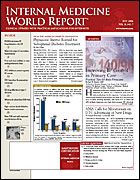Publication
Article
Internal Medicine World Report
Valsartan First Antihypertensive Shown to Lower crp
Author(s):
NEW YORK CITY—The angiotensin receptor blocker valsartan (Diovan) is the first antihypertensive medication to demonstrate an ability to lower levels of C-reactive protein (CRP), the inflammatory marker that is highly predictive of adverse cardiovascular (CV) outcomes, said Paul M. Ridker, MD, MPH, director of the Center for Cardiovascular Disease Prevention, Brigham and Women’s Hospital, Boston, at the 21st annual meeting of the American Society of Hypertension.
The effect of valsartan on CRP could be neutralized by adding the diuretic hydrochlorothiazide (Hydro-Par), he said.
“Inflammation is crucial to the development of hypertension,” said Dr Ridker. High-sensitivity (hs)-CRP can predict the risk of a normotensive person developing hypertension and has also been shown to modify the impact of blood pressure (BP) on stroke, myocardial infarction, and CV death.
“Inflammation is crucial to the development of hypertension.”
—Paul M. Ridker, MD
Dr Ridker and colleagues studied the effects of valsartan alone and in combination with hydrochlorothiazide on levels of hs-CRP in 1688 patients with stage 2 hypertension who were randomized to valsartan (160 mg/d) or to valsartan plus hydrochlorothiazide (12.5 mg/d). The valsartan dosage was titrated to 320 mg/day at week 2.
The primary BP/hs-CRP end point was measured at week 6. At that time, hydrochlorothiazide 12.5 mg/day was added to the regimen in the valsartan monotherapy group, and the daily dosage of hydrochlorothiazide was increased to 25 mg in the combination group. BP and hs-CRP were measured again at week 12.
P
P
At 6 weeks, changes in systolic BP were statistically superior ( <.001) with the combination compared with valsartan monotherapy, and significantly more patients in the combination arm achieved a BP of ≤140/90 mm Hg ( <.001).
P
In the valsartan monotherapy group, the median hs-CRP level decreased by 8.9% (from 2.17 mg/L at baseline to 1.98 mg/L at 6 weeks); in the combination therapy group, hs-CRP increased by 4.4%, for a between-group median percentage change in hs-CRP of 13.3% ( <.001).
The difference between the effects of valsartan and valsartan/hydrochloro-thiazide on hs-CRP was observed in all subgroups studied, despite greater BP reductions in the group receiving combination therapy, said Dr Ridker.
“There was no relationship whatsoever between the extent of blood pressure reduction and the change in hs-CRP,” he said. The same effect of valsartan on hs-CRP was seen in statin users and nonusers and in aspirin users and nonusers, he said.
This is the first known data showing beneficial effects of a hypertensive medication on hs-CRP, said Dr Ridker. “As far as we know, angiotensin-converting-enzyme inhibitors don’t have this effect,” he said. “I generally believe in class effect, but we’ve been proven wrong so many times….It is incumbent to prove [this effect] with other drugs.”
When asked why adding hydrochlorothiazide to valsartan neutralized the latter’s effect on hs-CRP, he speculated that hydrochlorothiazide may change levels of plasminogen activator inhibitor-1 and clotting parameters, “2 factors that track with hs-CRP levels.”
Although no study has shown that lowering hs-CRP levels reduces the risk of CV disease, most proven CV disease interventions, such as weight loss, aspirin, smoking cessation, and statins, do lower hs-CRP, even though “that doesn’t prove causality,” he said.
W.K
In the future, trials of antihypertensive drugs may need to focus on higher-risk patients, such as those with elevated hs-CRP, to detect clinical differences between drugs, he added.—.
KEY POINTS
Valsartan is the first antihypertensive medication to demonstrate an ability to lower CRP.
The difference between valsartan and valsartan/hydrochlorothiazide on hs-CRP was observed in all subgroups.
It has been suggested that lowering hs-CRP levels reduces the risk of CV disease, since increased CRP levels have been found to be associated with heart disease, but no evidence of a cause and effect exists.






